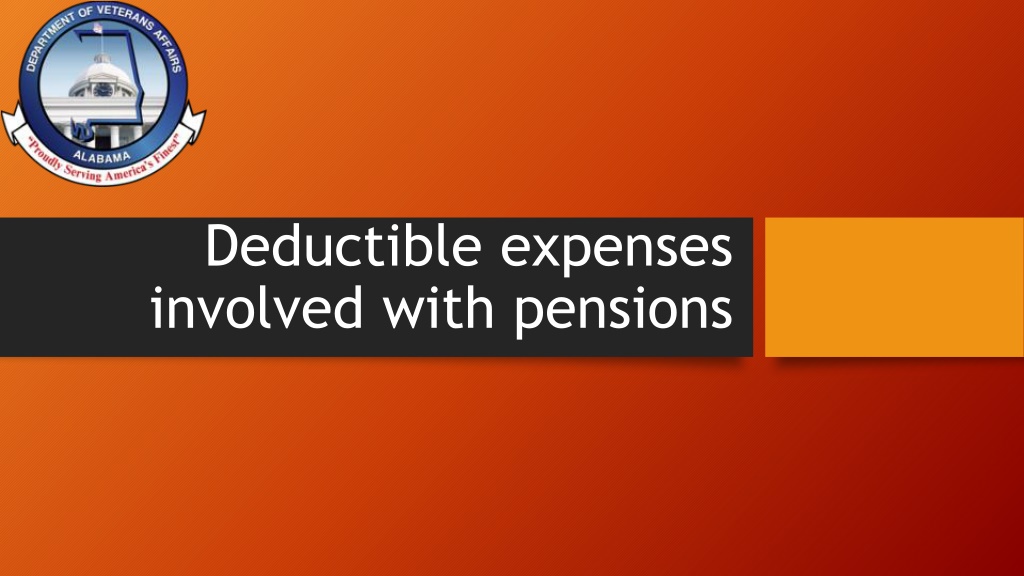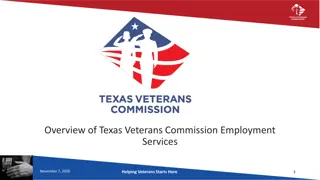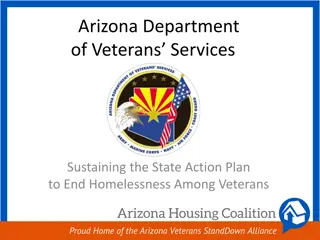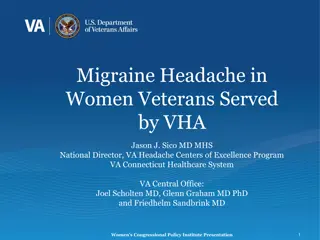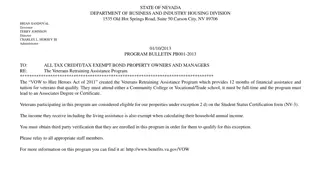Understanding Deductible Expenses in Pensions for Veterans
This detailed content explains the deductible expenses involved in pensions for veterans, outlining how specific expenses can reduce a veteran's "countable income" to determine eligibility for improved pension benefits. It covers various income considerations, recurring and nonrecurring income definitions, and exclusions from countable income. Veterans can benefit from understanding these concepts to maximize their pension entitlement.
Download Presentation

Please find below an Image/Link to download the presentation.
The content on the website is provided AS IS for your information and personal use only. It may not be sold, licensed, or shared on other websites without obtaining consent from the author. Download presentation by click this link. If you encounter any issues during the download, it is possible that the publisher has removed the file from their server.
E N D
Presentation Transcript
Deductible expenses involved with pensions
References Title 38, U.S. Code, Chapter 15 38 Code of Federal Regulations, Part 3 and 4 Adjudication Manual, M21-1MR (Manual Rewrite), Part 5 Veterans Benefits Manual, Chapter 6 Federal Benefits for Veterans, Dependents and Survivors
Income and Net Worth If eligible, the veteran s benefit will be the difference between his or her countable income and the annual pension limit set by Congress. The V.A. will pay the veteran the difference in 12 equal monthly payments. The income and net worth limits are spelled out in 38 U.S.C. 1521-1522.q
Income and Net Worth Recurring income means income which is received or anticipated in equal amounts and at regular intervals (e.g., weekly, monthly, quarterly, etc.), and which will continue throughout an entire 12- month annualization period. Irregular income means income which is received or anticipated during a 12-month annualization period but which is received in unequal amounts or at irregular intervals. The amount of irregular income for pension purposes will be the amount received or anticipated during a 12-month annualization period.
Income and Net Worth Nonrecurring income means income received or anticipated on a one-time basis during a 12-month annualization period (e.g., an inheritance). Salary means the gross amount of a person's earnings or wages before any deductions are made for such things as taxes, insurance, retirement plans, Social Security, etc.
Deductible Expenses The Veterans "countable income" is reduced by specific expenses. However, often Veterans believe that they are not eligible for pension because they make too much or are denied because they do not know the complete list of income exclusions and deductible expenses that would reduce their "countable income".
3.272 Exclusions from income The following shall be excluded from countable income for the purpose of determining entitlement to improved pension. Unless otherwise provided, expenses deductible under this section are deductible only during the 12-month annualization period in which they were paid.
(a) Welfare. Donations from public or private relief, welfare, or charitable organizations. (b) Maintenance. The value of maintenance furnished by a relative, friend, or a charitable organization (civic or governmental) will not be considered income. Where the individual is maintained in a rest home or other community institution or facility, public or private, because of impaired health or advanced age, money paid to the home or the individual to cover the cost of maintenance will not be considered income, regardless of whether it is furnished by a relative, friend, or charitable organization. The expense of maintenance is not deductible if it is paid from the individual's income. (c) Department of Veterans Affairs pension benefits. Payments under chapter 15 of title 38, United States Code, including accrued pension benefits payable under 38 U.S.C. 5121.
(d) Reimbursement for casualty loss. Reimbursement of any kind for any casualty loss. The amount to be excluded is not to exceed the greater of the fair market value or the reasonable replacement cost of the property involved at the time immediately preceding the loss. For purposes of this paragraph, the term casualty loss means the complete or partial destruction of property resulting from an identifiable event of a sudden, unexpected or unusual nature. (e) Profit from sale of property. Profit realized from the disposition of real or personal property other than in the course of business, except amounts received in excess of the sales price, for example, interest on deferred sales is included as income. In installment sales, any payments received until the sales price is recovered are not included as income, but any amounts received which exceed the sales price are included, regardless of whether they represent principal or interest. (f) Joint accounts. Amounts in joint accounts in banks and similar institutions acquired by reason of death of the other joint owner.
(g) Medical expenses. Within the provisions of the following paragraphs, there will be excluded from the amount of an individual's annual income any unreimbursed amounts which have been paid within the 12-month annualization period for medical expenses regardless of when the indebtedness was incurred. An estimate based on a clear and reasonable expectation that unusual medical expenditure will be realized may be accepted for the purpose of authorizing prospective payments of benefits subject to necessary adjustment in the award upon receipt of an amended estimate, or after the end of the 12-month annualization period upon receipt of an eligibility verification report. For the definition of what constitutes a medical expense, see 3.278, Deductible medical expenses.
(1) Veteran's income. Unreimbursed medical expenses will be excluded when all of the following requirements are met: (i) They were or will be paid by a veteran or spouse for medical expenses of the veteran, spouse, children, parents and other relatives for whom there is a moral or legal obligation of support; (ii) They were or will be incurred on behalf of a person who is a member or a constructive member of the veteran's or spouse's household; and (iii) They were or will be in excess of 5 percent of the applicable maximum annual pension rate or rates for the veteran (including increased pension for family members but excluding increased pension because of need for aid and attendance or being housebound) as in effect during the 12-month annualization period in which the medical expenses were paid. (2) Surviving spouse's income. Unreimbursed medical expenses will be excluded when all of the following requirements are met: (i) They were or will be paid by a surviving spouse for medical expenses of the spouse, veteran's children, parents and other relatives for whom there is a moral or legal obligation of support; (ii) They were or will be incurred on behalf of a person who is a member or a constructive member of the spouse's household; and (iii) They were or will be in excess of 5 percent of the applicable maximum annual pension rate or rates for the spouse (including increased pension for family members but excluding increased pension because of need for aid and attendance or being housebound) as in effect during the 12-month annualization period in which the medical expenses were paid.
(2) Surviving spouse's income. Unreimbursed medical expenses will be excluded when all of the following requirements are met: (i) They were or will be paid by a surviving spouse for medical expenses of the spouse, veteran's children, parents and other relatives for whom there is a moral or legal obligation of support; (ii) They were or will be incurred on behalf of a person who is a member or a constructive member of the spouse's household; and (iii) They were or will be in excess of 5 percent of the applicable maximum annual pension rate or rates for the spouse (including increased pension for family members but excluding increased pension because of need for aid and attendance or being housebound) as in effect during the 12-month annualization period in which the medical expenses were paid.
(3) Children's income. Unreimbursed amounts paid by a child for medical expenses of self, parent, brothers and sisters, to the extent that such amounts exceed 5 percent of the maximum annual pension rate or rates payable to the child during the 12- month annualization period in which the medical expenses were paid.
(h) Expenses of last illnesses, burials, and just debts. Expenses specified in paragraphs (h)(1) and (h)(2) of this section which are paid during the calendar year following that in which death occurred may be deducted from annual income for the 12-month annualization period in which they were paid or from annual income for any 12-month annualization period which begins during the calendar year of death, whichever is to the claimant's advantage. Otherwise, such expenses are deductible only for the 12-month annualization period in which they were paid.
(i) Amounts paid by a spouse before a veteran's death for expenses of the veteran's last illness will be deducted from the income of the surviving spouse. (ii) Amounts paid by a surviving spouse or child of a veteran for the veteran's just debts, expenses of last illness and burial (to the extent such burial expenses are not reimbursed under chapter 23 of title 38 U.S.C.) will be deducted from the income of the surviving spouse or child. The term just debts does not include any debt that is secured by real or personal property.
A complete listing of eligible deductions can be found at 38 CFR 3.272 - Exclusions from income
Summary The rules on pension have changed dramatically over the last several months. Always dig for information from your veterans and their families to ensure all possible deductions are considered.
